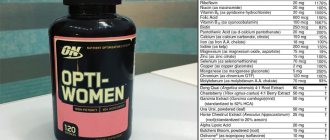Vitamins for pregnant women - how to choose the best? Comparing the most popular complexes
Everyone knows: a pregnant woman uses up her vitamins and minerals for two. However, today the range of vitamin and mineral complexes is so large that it is difficult not to get confused.
Which drug should I choose? To answer this question, it is worth carefully analyzing their composition.
What must be included in the complex for pregnant women? Are the dosages and forms of nutrients important?
For comparison, we have selected the most popular complexes intended for expectant mothers. Our rating includes 7 drugs: Alphabet Mom's Health, Complivit Mama, Pregnoton Mama, Vitrum Prenatal, Complivit Trimester, Elevit, Femibion.
A comparison of their compositions is given in the table.
| Complex | Vitamins | Minerals | Additionally |
| Alphabet Mom's health | Beta-carotene, B 1, B2, B5, B6, folic acid, B12, PP, C, D3, E, K, biotin | Electrolytic iron, copper, magnesium, manganese, selenium, zinc, molybdenum, calcium, chromium, phosphorus, iodine | L-taurine |
| Vitrum Prenatal | A, B1, B 2, B6, folic acid, B12, PP, C, D3, E | Iron (fumarate), calcium, zinc | |
| Complimentary Mom | A, B1, B 2, B6, folic acid, B12, PP, C, D2, E | Iron (fumarate), calcium, magnesium, phosphorus, copper, zinc, manganese | |
| Complivit Trimester (I, II and III) | A, B1, B 2, folic acid, B5, B 6, B12, PP, C, D3, E, P | Iron (fumarate), copper, selenium, manganese, calcium, magnesium, zinc, iodine | Lipoic acid, lutein |
| Pregnoton Mom | B1, B2, B3, B5, B 6, folic acid + calcium L-methylfolate, B12, C, D3, E, biotin | Iron in liposomal form, iodine, selenium, zinc | Omega-3 DHA |
| Femibion Natalcare (1 and 2) | B1, B 2, B5, B6, folic acid + L-methylfolate, B12, PP, C, E | Iodine | Omega-3 DKG (only in Natalcare 2) |
| Elevit Pronatal | A, B1, B 2, B6, folic acid, B12, PP, C, D3, E, biotin | Iron (fumarate), calcium, phosphorus, magnesium, zinc, calcium, copper, manganese |
The first thing to note is the wide variety of micronutrients. A number of complexes include, in addition to vitamins and minerals, other important substances - such as Omega-3, taurine, lutein. A more detailed study reveals that each complex includes folic acid, but iodine, which regulates the functioning of the thyroid gland, is not present everywhere. The same can be said about calcium and iron. This means that simply by comparing formulations, we will not be able to choose the best drug. Therefore, we will have to investigate the issue deeper.
Most experts believe that the most important micronutrients during pregnancy are folic acid, iodine, and iron. Omega-3 PUFAs are often added to them. Let's study what effect this four has and whether it is present in popular drugs.
Folic acid: what is important?
Folic acid, or vitamin B9, is the most important vitamin for pregnant women. Our mothers and grandmothers also took it during the period of bearing a child. It is not surprising that vitamin B9 is included in all vitamin complexes for expectant mothers.
Folic acid deficiency can cause serious developmental problems in the fetus:
1. In the first trimester, a lack of vitamin B9 is especially dangerous, because it can cause a defect in the closure of the neural tube, spina bifida, and underdevelopment of the brain.
2. In the second trimester, folic deficiency leads to disturbances in the development of the heart, blood vessels, and organs of the urinary system.
3. In the third trimester, a deficiency of this vitamin affects the child’s growth and brain health.
Unfortunately, a lack of vitamin B9 is genetically determined in half of the population of our planet. About 50% of people do not produce enough of the enzyme needed to convert folic acid into its active form, methylfolate. There are also those who do not synthesize the enzyme at all - their number (according to various estimates) is from 5 to 25%. These people should only take methylfolate. It is absorbed regardless of genetic characteristics, that is, deficiency will not occur.
The active form of vitamin B9 - methylfolate - is contained in only two drugs: Femibion and Pregnoton Mama.
"Iron" necessity
Iron levels are one of the “sick” topics in the relationship between the expectant mother and her attending physician. Pregnant women have to constantly take tests for hemoglobin. If they show decreased levels, the doctor will immediately prescribe iron supplements. The need for this measure is easy to explain.
The blood volume in a pregnant woman's body becomes larger, and hemoglobin is needed for the formation of red blood cells (iron is one of its components). If there is not enough iron, the fetus may develop oxygen starvation, and the mother may develop iron deficiency anemia. This condition can lead to serious consequences: lack of weight in the baby, underdevelopment, premature birth.
What seems complicated here? If the doctor prescribed iron, then you need to take it. However, there is a problem: iron in the form of salts (namely, in this form it is contained in supplements) is poorly absorbed (about 10%) and causes side effects: constipation, vomiting, severe abdominal pain. It is for this reason that many pregnant women stop taking iron supplements even with low hemoglobin levels.
However, today a solution to this problem has emerged - iron in liposomal form. This iron is in a shell of lipids, due to which it is absorbed 4.7 times better than standard forms, and does not cause discomfort from the gastrointestinal tract.
If you experience nausea, pain or other discomfort while taking iron supplements, switch to liposomal iron. It is well absorbed and has no side effects.
| Alphabet Mom's health | Vitrum Prenatal | Complimentary Mom | Complivit Trimester | Pregnoton Mom | Femibion | Elevit Pronatal |
| Electrolytic iron | Iron (fumarate) | Iron (fumarate) | Iron (fumarate) | Liposomal iron | — | Iron (fumarate) |
Do I need iodine?
Pregnancy and childbirth can proceed normally only if the woman and child receive sufficient amounts of iodine. The fact is that iodine is part of hormones that directly regulate the intrauterine development of the fetus. Why is iodine deficiency dangerous?
- The child has a high probability of developmental delay, congenital hearing and speech defects (deafness, deaf-muteness), as well as mental retardation and underweight.
- A woman has a goiter of the thyroid gland (overgrowth).
However, iodine deficiency is a common situation for 70% of the Russian population. Research data from the Russian Academy of Medical Sciences show that no more than 37% of the required amount of iodine enters the body of a pregnant woman with food.
As with iron, large doses of iodine scare women. However, these doubts and fears are in vain: taking iodine-containing complexes is not recommended only for women with Graves' disease. This is a rare disease, occurring in only 2% of the world's population.
| Alphabet Mom's health | Vitrum Prenatal | Complimentary Mom | Complivit Trimester | Pregnoton Mom | Femibion Natalcare I and II | Elevit Pronatal |
| Iodine 150 mcg | — | — | Trimester 1 Iodine 200 mcg Trimester 2 Iodine 150 mcg Trimester 3 Iodine 100 mcg | Iodine 150 mcg | Iodine 150 mcg | — |
What is the difference between regular vitamins and prenatal vitamins?
A pregnant woman needs more vitamins and minerals, which she will share with the fetus for its normal development: so the first difference is the dose. Which is adjusted depending on the stage of pregnancy. With each trimester, the fetus grows and develops, and therefore, the composition of nutrients for it and the expectant mother, which maintains these processes in order, may change. Specialized vitamin complexes differ from ordinary vitamin complexes in their composition and dosage, which are created taking into account the characteristics of a pregnant woman’s body, and taking into account the optimal maintenance of the processes that are launched in it. The recommended norm of vitamins and minerals, its dose for women carrying a child, looks like this:
| Vitamins - daily dose | Microelements - daily dose |
| IN 12 – 3.0-4.0 mcg; B9 – 0.8-1 mg; B6 – 2.5 mg; B5 – 4-7 mg; B3 – 15-20 mg; B2 – 1.5-2.0 mg; B1 – 1.5-2.0 mg; A – up to 2500 IU; D – 400-600 IU; E – 10-15 IU; C – 70-100 mg; K – 65-80 mcg; N – 30-100 mcg . | Iron 30-60 mg Iodine 175-200 mcg Calcium 1000-1200 mg Magnesium 320-355 mg Manganese 2.0-5.0 mg Copper 1.5-3.0 mg Molybdenum 75-250 mcg Selenium 5-75 mcg Phosphorus 1200 mg Chromium 25 mcg Zinc 15-20 mg |
First trimester vitamins:
The most important one, which requires a more reverent attitude and attention from the woman herself, the doctor and, perhaps, all family members. Because during this period the nervous system of the future baby is formed, the circulatory and cardiovascular systems are formed. In order for these processes to proceed safely, a woman needs to include vitamins such as:
- For normal growth and proportions of the unborn baby - vitamin A;
- To reduce the likelihood of toxicosis and seizures, as well as relieve nervous excitability - B vitamins, in particular B6, which is recommended to be taken along with magnesium;
- For the proper formation of the fetal neural tube, from where the brain and spinal cord will form, taking another B vitamin - B9 - folic acid is vital.
- For the normal development of the circulatory system of the unborn baby and maintaining the development process of the embryo as a whole - iodine and iron.
IMPORTANT TO KNOW: Folic acid is one of the few vitamins that is not produced by our body and we only have a small amount of it thanks to beneficial intestinal bacteria that synthesize folic acid. Food or vitamins from the pharmacy are the only sure way to meet your daily requirement.
Second trimester vitamins:
No less important than the beginning of pregnancy. And if at the end of the 1st trimester all the baby’s systems and organs are already formed, then the 2nd trimester is the time for his active development and growth. So, at this stage it is important to include in a woman’s diet:
- All the same B vitamins - for the normal functioning of the baby’s nervous system, to maintain normal production of amino acids and chemical elements, prevent deficiency of hemoglobin cells, reduce the risk of late toxicosis in women;
- Vitamin for immunity - C;
- Vitamin and mineral for healthy growth of bones and cardiovascular system of the baby and preventing the destruction of bone tissue in women - D; calcium
- Vitamin to maintain the normal condition of the placenta and reduce the risk of early birth - E;
- Maintaining normal hemoglobin levels and reducing the risk of anemia to zero - iron;
- Maintenance of the thyroid gland, which produces vital hormones in the body of a pregnant woman and normal development of the brain in the fetus - iodine.
IMPORTANT TO KNOW: the baby receives all nutrients, including essential vitamins and minerals, from the mother. Thus, the food habits of the unborn child, his health and immunity are formed in the womb. Therefore, it is very important to monitor the diet of a woman who is expecting a child.
Third trimester vitamins:
The 3rd trimester is the final stage of pregnancy, during which the fetus reaches a large size and becomes more active. The load on a woman's body increases. Why and what vitamins are needed now:
- Vitamin D is important for maintaining normal metabolism of calcium and phosphorus - the main elements for the formation of a healthy skeleton, and this vitamin is also important for preventing childhood rickets and bone deformations.
- B vitamins are required to reduce the risk of late toxicosis, for normal fluid circulation in the female body and its elimination; for the production of growth hormone, which is important for the baby.
- Vitamin for immunity - C - but, in addition to protecting the health of the baby and the pregnant woman, this vitamin protects other incoming fat-soluble vitamins from oxidation, thereby promoting their better absorption.
- Vitamins for normal functioning of the placenta, good elasticity of the skin and uterine walls - A, E.
Among the large availability of vitamins for pregnant women, we recommend focusing on the following manufacturers, with an optimal price/quality/safety ratio:
Multi-tabs PERINATAL
(contain Omega-3 polyunsaturated fatty acids, which are important for the pregnant woman and the fetus, improve placental blood circulation ,reduce the risks of developing placental insufficiency, fetal hypoxia, gestosis, premature birth).
Femibion natalker
(contains 9 vital vitamins and iodine, balances carbohydrate metabolism and energy supply, useful vitamins for hematopoiesis and strengthens the nervous system).
Complivit Mama
(combined multivitamin preparation, contains a set of micro- and macroelements that maintain the stability of red blood cells, promotes the normal development of the placenta and embryonic tissues, the vitamins included in the composition stimulate the synthesis of amino and nucleic acids, inhibits the development of anemia).
Elevit pronatal
(contains the optimal amount of vitamins and minerals for a complete diet for pregnant and lactating women).
AlfaVit Mom's Health
(a hypoallergenic combination of vitamins and minerals, containing iron, calcium, Vitamin D, folic acid in optimal dosages, suitable for use in the 1st trimester of pregnancy to support the proper development of the embryo).
- Choose your vitamins wisely. Before taking it, consult a specialist so that he can help you choose a drug based on your characteristics.
- carefully study the instructions, contraindications and composition.
- Pregnant women experience allergic reactions to a certain vitamin or their combination, so it is better to undergo additional examination to eliminate risks during pregnancy or replace some vitamins with others.
- Vitamins should be taken at the same time so that they accumulate evenly in the blood and tissues, so the embryo will receive an even supply of useful substances.
- Experts do not recommend taking any vitamin on an empty stomach. It is advisable to do this after eating. This is due to the fact that beneficial substances will be better absorbed in the intestines, dissolved in food, and problems with the mucous membranes of the stomach are undesirable for pregnant women.
- The best time to take vitamins is in the morning after breakfast.
- Stick to exact dosages! If you miss a vitamin dose, do not try to “catch up with the dose” at the next dose by taking two tablets or capsules.
What about calcium?
Calcium is not always included in vitamin and mineral complexes for pregnant women. The reason lies in the ambiguity of this mineral. It is undoubtedly extremely important for the normal development of the fetus and the well-being of the mother: without it, cramps often appear, bones become fragile, and teeth suffer. But, on the other hand, if there is too much calcium, problems may arise. If there is an excess of calcium, the placenta becomes calcified, which interferes with the supply of necessary substances to the fetus. The woman’s pelvic bones become too hard and diverge worse, and the baby’s skull becomes rigid, which can cause complications during childbirth.
However, these are not all the problems associated with calcium. It interferes with the absorption of iron when both elements enter the body at the same time. But iron is needed by the body of mother and child. Therefore, doctors tend to prescribe calcium supplements only when there is clearly a deficiency. In this case, calcium is most often prescribed as a separate drug, since quite a lot of calcium is needed to combat deficiency, and it simply “will not fit” in a tablet or capsule with other useful substances.
To solve these problems, manufacturers had to work hard. Thus, the Alphabet Mom’s Health complex includes both components, but they are in separate tablets. This solution made it possible to leave a large dosage of calcium, but to exclude its contact with iron. Manufacturers Femibion and Pregnoton Mama excluded calcium in favor of iron. There is very little calcium in other preparations; it will not help cope with the deficiency.
| Alphabet Mom's health | Vitrum Prenatal | Complimentary Mom | Complivit Trimester | Pregnoton Mom | Femibion Natalcare I and II | Elevit Pronatal |
| Calcium (in a separate tablet) 250 mg (25%) | Calcium 200 mg (20%) | Calcium 25 mg (2.5%) | Trimester 1 30 mg (3%) Trimester 2 40 mg (4%) Trimester 3 50 mg (5%) | — | — | Calcium125 mg (12.5%) |
Vitrum prenatal
Vitrum prenatal is a complex of vitamins, macro- and microelements. Designed to prevent hypovitaminosis and lack of minerals during pregnancy and lactation. Contains the entire set of “life amines” and minerals necessary for a pregnant woman, fetus and newborn child. Riboflavin (vitamin A) regulates the production of vital enzymes and has a beneficial effect on the development of muscle tissue. It regulates hormonal levels, participates in the synthesis of the immune protein interferon, epithelial cells, normalizes the condition of the inner lining of the eye, being responsible for the so-called. twilight vision. Cholecalciferol (vitamin D3) affects protein metabolism and regulates calcium and phosphorus levels. It ensures better absorption of calcium in the digestive tract and subsequent accumulation in growth areas. Calcium deficiency is dangerous due to the possible deterioration of bone health in the mother, the future, and then the born child. Cholecalciferol is useful not only during pregnancy, but also during breastfeeding until its end. Tocopherol (vitamin E) improves the rheological characteristics of the blood, ensures the elimination of toxins and decay products from the body, strengthens the walls of blood vessels, stimulates blood circulation, which is especially important during pregnancy, because. At this time, the woman’s circulating blood volume increases, reaching a peak at the 7th month, requiring more resources to maintain the proper intensity of blood circulation. A lack of tocopherol can cause impaired blood circulation in the capillary bed, which negatively affects not only the mother, but also the growing fetus. Ascorbic acid (vitamin C) is actively involved in redox reactions, is in demand in the synthesis of the structural protein collagen, promotes tissue restoration, improves immune status, and promotes the absorption of iron in the digestive tract.
Vitamin C deficiency leads to impaired permeability of the vascular wall and suppression of the secretion of steroid hormones. Folic acid is an integral component of any vitamin and mineral complex for pregnant women. It ensures the normal development of the fetal nervous system, preventing the formation of congenital pathologies. Thiamine (vitamin B1) is involved in the metabolism of carbohydrates and prevents the acid-base balance from shifting to the “acidic” side, thereby ensuring the normal functioning of organs and systems. Riboflavin (vitamin B2) ensures cellular respiration and helps pyridoxine (vitamin B6) enter its active form. Pyridoxine, in turn, is a participant in most metabolic processes, a supplier of iron to the bone marrow, and a regulator of the central nervous system. Cyanocobalamin (vitamin B12) prevents the destruction of the walls of red blood cells, controls the process of transformation of parenchymal cells into fat deposits, thereby preventing excessive weight gain while expecting a child. Nicotinamide (vitamin PP) is an active participant in the formation of proteins and lipids. In addition, it prevents blood clots. Calcium is in demand in the formation of bone tissue, ensures normal iron absorption and nerve conduction. Iron is used by the body as a carrier of oxygen to cells and a catalyst for redox reactions. Zinc is involved in the synthesis of bone cells and the regulation of hormonal balance.








